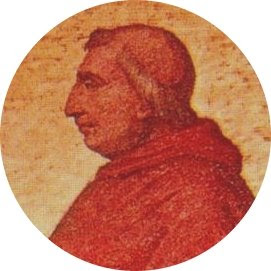Today marks the death of Pope Innocent VIII, and the following is taken from the 1911 Catholic Encyclopedia:
Born at Genoa, 1432; elected 29 August, 1484; died at Rome, 25 July, 1492. He was the son of the Roman senator, Aran Cibò, and Teodorina de’ Mari. After a licentious youth, during which he had two illegitimate children, Franceschetto and Teodorina, he took orders and entered the service of Cardinal Calandrini. He was made Bishop of Savona in 1467, but exchanged this see in 1472 for that of Molfetta in south-eastern Italy and was raised to the cardinalate the following year. At the conclave of 1484, he signed, like all the other cardinals present, the election capitulation which was to bind the future pope. The choice fell on Cibò himself who, in honour of his countryman, Innocent IV, assumed the name of Innocent VIII. The chief concern of the new pope, whose kindliness is universally praised, was the promotion of peace among Christian princes. He earnestly but unsuccessfully endeavoured to unite Christendom against the Turks. In England he proclaimed the right of King Henry VII and his descendants to the English throne and also agreed to some modifications affecting the privilege of “sanctuary”. The only canonization which he proclaimed was that of Margrave Leopold of Austria (6 Jan., 1485). He issued an appeal for a crusade against the Waldenses, actively opposed the Hussite heresy in Bohemia, and forbade (Dec., 1486) under penalty of excommunication the reading of the nine hundred theses which Pico della Mirandola had publicly posted in Rome. On 5 Dec., 1484, he issued his much-abused Bull against witchcraft, and 31 May, 1492, he solemnly received at Rome the Holy Lance which the Sultan surrendered to the Christians. Constantly confronted with a depleted treasury, he resorted to the objectionable expedient of creating new offices and granting them to the highest bidders. Insecurity reigned at Rome during his rule owing to insufficient punishment of crime. However, he dealt mercilessly with a band of unscrupulous officials who forged and sold papal Bulls; capital punishment was meted out to two of the culprits in 1489. Among these forgeries must be relegated the alleged permission granted the Norwegians to celebrate Mass without wine.












